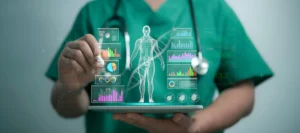Industry 4.0 has been revolutionizing production chains throughout the world. In this context, smart metrology is aligned to demand for more intelligent and interlinked processes that play an important role in the control of advanced manufacturing.
Systems that embrace technologies such as the Internet das Coisas (IoT), Big Data, computer vision are increasingly used in a wide variety of productive sectors. By using an infinite quantity of data, they can help to understand a more complex reality.
However, to be effective, the maxim applies that the data and information collected must be reliable!
The tools and methodologies for measurement and quality control have a fundamental role in advanced manufacturing, helping to make processes even more agile by capturing and interpreting detailed data about the links of the production chain, and guaranteeing greater reliability and agility.
This post will explain how smart metrology functions, its advantages, and how it can be applied to agribusiness.
Smart Metrology: greater reliability and better quality control
Smart metrology brings a different approach to traditional metrology: more than only realizing measurements with reliability, it focuses on evaluating risks and equilibrium – considering the variety of data – and directly supports decision making. It thus involves delivering knowledge and not only data, to influence the entire chain.
For this reason, metrology comes to perform a role closer to that of data analysis. In other words, it no longer focuses on an isolated measurement and comes to measure all the data in a chain, seeking to understand the entire path – from raw materials to final consumers – to identify failures and conduct predictive analyses.
In this way, quality control in companies no longer depends on a final evaluation by sampling. Since most of the equipment involved in production today already have sensors, it is possible to control various variables involved in production, such as humidity, temperature, speed, rotations, vibration, and others.
By correlating these variables it is possible to evaluate and monitor each step of the production chain and guarantee the quality of the final product.
Thus, guided towards a practice that is more aligned with the development of industry 4.0, smart metrology influences reliability and considers the uncertainty of measurements and the diversity of data to allow more assertive and precise decision making.
The benefits of Smart Metrology for industry
Some of the benefits of intelligent metrology for industry are:
- More efficient use of resources: with high precision in quality control, it is possible to obtain more reliable data and thus reduce
- production rejects. This allows better use of resources, avoiding waste of raw material, time, and energy.
- Standardization: the technology allows greater uniformity of processes, which reflects directly on a standardization more aligned to products.
- Greater productivity: since the number of problems faced during the production process is reduced, operations and performance are improved, increasing productivity.
- More competitiveness smart metrology allows a company to stay ahead of its competitors, given that it provides a detailed and careful analysis of processes, which makes a tremendous difference in the quality of the product and in the results. Moreover, it creates an environment for new correlations, supporting innovation in products and processes.
Applications of Smart Metrology in agriculture
Metrology is already part of agribusiness, more precisely in measurements that are conducted daily. The differential offered by smart metrology, as we saw, is to provide a much deeper analysis that is integrated along the entire chain.
Meteorological factors
More than just measuring the environment, its temperature, humidity, atmospheric pressure, solar incidence and windspeed, smart metrology accompanies these factors over time and correlates them with indicators of the quality of the process.
This allows foreseeing aspects of production or even degradation of machines and inventories based on meteorological forecasts, while always considering the uncertainty of each variable involved.
Productive aspects
The intelligent measurement of variables is also present in aspects more directly linked to production, correlating factors such as the monitoring of soil humidity and water quantity applied historically to, for example, control the weight of farm animals and. their feeding histories, breeds, and even pasture movements.
Another possible use refers to control in the application of fertilizers, avoiding an excessive use of chemicals and as thus environmental impacts on water sources and neighboring lands caused by the flow of these substances.
In addition, as takes place with the monitoring of water and of micro variations in weather conditions, smart metrology allows estimating the quantities and proportions of fertilizers that should be applied in each area of a field.
How does intelligent metrology function in agribusiness?
All of these applications of metrology in agribusiness are only possible by means of technology, especially the use of intelligent sensors. This equipment can be installed in machinery (tractors, combines, and others), in greenhouses, at different points of a crop or for a herd, and conduct a series of real time measurements of different variables and send them to a system.
The data collected are then worked with and correlated to generate predictions with estimated levels of uncertainty. This facilitates the implementation of improvements and adjustments that help improve production quality.
For this process to be even more effective, smart metrology can be combined with analytical calculations or even Artificial Intelligence models, expanding the capacity of data analysis and statistical techniques. CERTI’s fields of competence related to the development of advanced agricultural equipment include metrology and instrumentation.
To find out how we can help in the technological development of agribusiness using smart metrology, learn about the Yara Buoy Project and discover the possibilities that this technology can offer!







